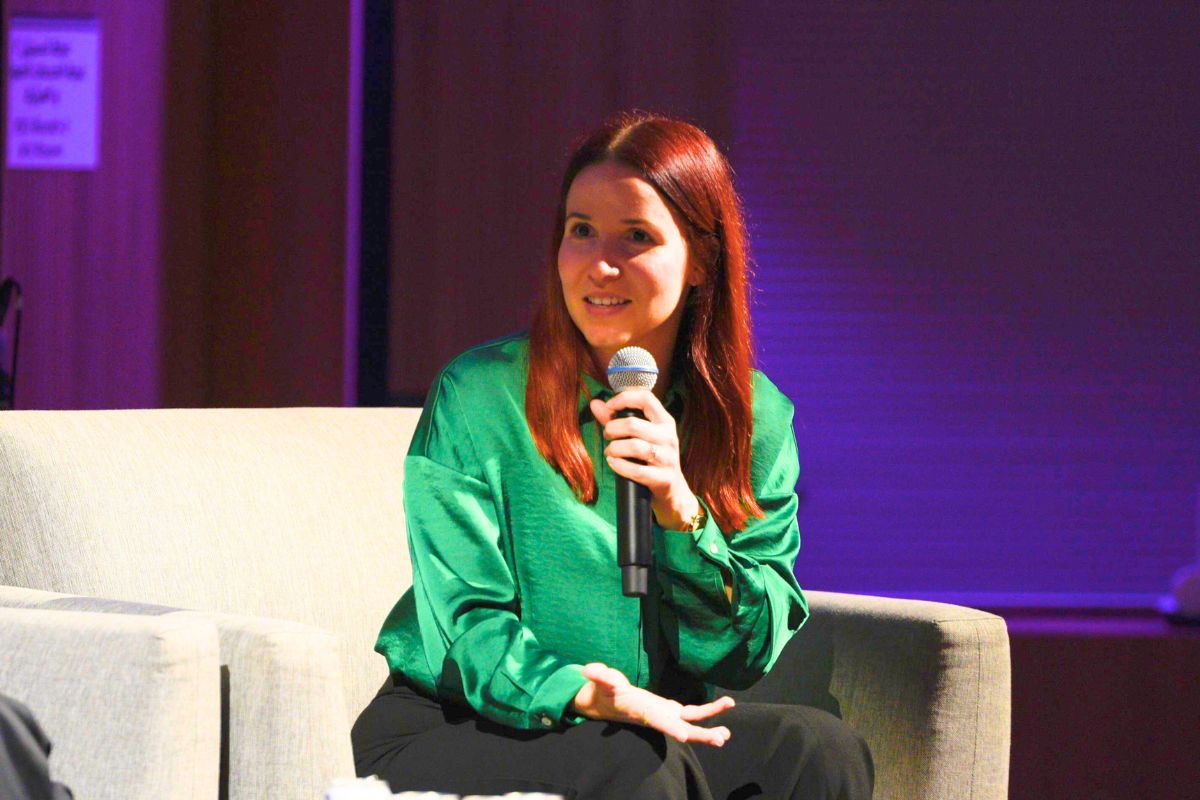
Discover the trailblazing story of Monica Woodman, the visionary conductor at the groundbreaking Firdaus Orchestra, an initiative of Expo City Dubai
“There’s still sadly, this misconception about what a conductor is and that we are a human metronome,” says Monica Woodman, the resident conductor of the all-female Firdaus Orchestra, an initiative of Expo City Dubai.
Shortly before she’s due to join an International Women’s Day panel at Firdaus Studio, Expo City, the arguable beating heart of the orchestra is the picture of elegant composure as she sits down for a chat.
A 2013 graduate of Havana’s Higher Institute of Art, there’s no dearth of accomplishments to Monica’s name. Coming from an artistic family, music was given, and her career was as good as sealed the moment she saw someone conducting a choir.
“So I decided to enter the conservatory four years into my bachelor’s degree as a choir conductor. Later, I think as a human impulse, you want to go a little bit bigger. So I wanted to go to university where I did my master’s for five years as a symphonic orchestra conductor. The two worlds are very different, conducting a choir versus an orchestra of 100-120 people,” says Monica.
While she was initially freelancing in the UAE, she was eventually contacted by the Firdaus Orchestra team via LinkedIn, and the rest is now history. With Monica at the helm, the group has successfully been a part of several major concerts ranging from performing classic Beethoven, Mozart and Mahler to the likes of Atif Aslam and pivoting to Disney Princess – The Concert
You might also like: Zayed National Museum unveils new exhibition in Dubai
The resident conductor’s pride over the group’s diverse skillset is evident as she shares, “We have a non-conventional symphonic orchestra. What that means is that typically you have a section of strings woodwinds, brass, and classical instruments. Here on top of that, you have a section of Arabic instruments as a representation of the region. And we also have an Indian instrument, the sitar. And then you have also other instruments that are part of what we call the band, which are the electric guitar and electric bass drums. So you have three different worlds merge into one which is the Firdaus Orchestra.”
The only orchestra of its kind in the MENA region, having AR Rahman as a mentor has led to widespread recognition for the talented group. With the massively equipped Firdaus Studio as a base, the women’s ensemble of 56 musicians from 28 nationalities has scored for several massive feature films in addition to other ventures.
While Monica has trained and perfected more instruments than the average person, she remarks on the journey towards mastering some of the newer Arabic and Indian instruments.
“You sit with them, you read about their instruments and understand they have microtones. For most instruments, I had been learning it throughout my career, from seven until 24. But for learning something new it is your time that needs to be invested to understand how it works. They teach you but it’s also a lot of research, and you need to know how it works to be a conductor. Of course, you also need to be humble enough to say when you don’t know something, and then confirm that information.”
Given the level of skill one needs to possess, Monica highlights how most people are predisposed to assume conductorship as a profession for older people. And that’s just one of the myths she’s encountered over her career.
“People think as conductors we are just marking time and it’s not just that. We are guiding the whole journey that you will experience musically. Yes of course we control time, but we also focus on how we make you feel. Whatever you feel, which is subjective, when you listen to that piece, our job is to make sure you can find it relatable,” she adds.
A self-confirmed obsessed fan of Mexican conductor Alondra de la Parra, Monica stands as an unwitting role model to scores of musicians, especially women who might have been precluded from pursuing conductorship before. And while she acknowledges the changing times, she laments the lack of platforms afforded to her peers.
“I’m seeing way more female conductors now, studying and practising. But still, we don’t have as many platforms as we would like to because there is still this misconception that it’s an old person’s career. It is true that with experience you get better at conducting, as you mature you understand emotions differently. However, women are still fighting to get more space to be resident conductors. We have bigger numbers now as guest conductors in major orchestras, but still need more to be resident conductors and get into all kinds of programmes without judgement. So the changes are happening but they’re still a bit slow. We wished that by 2024 we would be in an equal place, but there’s still a long way to go.”
It’s an unspoken bias in the world of music that some instruments are looked at as more feminine and vice-versa. In leading a female-only orchestra then, Monica is establishing how flawed that thought process is, one of looking for ‘sturdy men’ to handle certain instruments.
As she puts it, “Some instruments have been stereotyped as played better by men, but the women here at Firdaus Orchestra are playing it wonderfully. So yes, we are living proof that we can do it. We can do it from our own place of sensitivity and nurturing kindness, delivering with the power and toughness required.”
And if you have any doubts, the ever-filling calendar of events is proof enough. It takes less than five minutes of watching them in action to reiterate facts, that music could certainly benefit from equality.
Follow Yalla –Dubai Life for all the latest news

